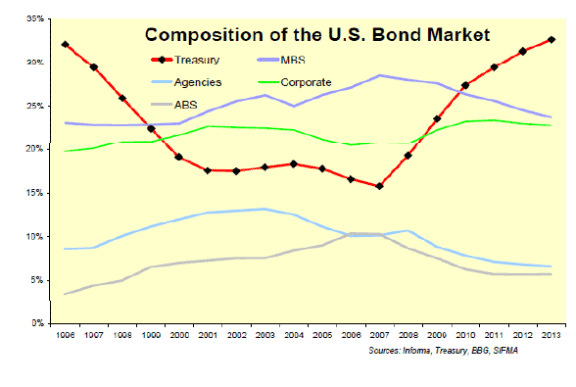Agency Bonds
Post on: 16 Март, 2015 No Comment

US Government Agency Bonds
US Government Agency bonds tend to offer higher yields than Treasuries, but lack the full faith and credit of the US government. Many believe that, in the event of a default of a federal agency, the government would act consistent with a moral obligation to make lenders whole, but that is not assured.
The recent insovency of Fannie Mae and Freddie Mac tested this implicit guarantee. The government did guarantee the debts of each agency, nationalizing them and bringing its losses on to its own balance sheet. There is no guaranteee though that this will happen in future cases.
Interest from certain agency securities, but not all, is not taxable at the state and local level. The Federal Home Loan Bank, the Federal Farm Credit Bank and the Tennessee Valley Authority are state and local tax exempt. Bonds offered by these agencies can offer a substantial premium to Treasuries for a taxable investors.
Most agency bonds are callable. The callable feature also creates an additional premium for investors who are willing to accept that the bonds may be called away from them (essentially the purchaser is receiving a premium for selling a call option). For the last several years and as a result of the decline in interest rates, these bonds tended to be called at or shortly after the first call date (usually three or six months), thereby yielding an excellent rate over a short period of time (often in excess of 5.50%). Bonds issued at high rates are today extremely highly likely to be called as a result of recent Fed rate cuts (and therefore you should never purchase a currently callable bond at greater than par value).
For example, a callable issue by the Federal Home Loan Bank or the Federal Farm Credit Bank might offer over 5.00% over 10 years. These bonds would be callable in three months (and every month thereafter). Assuming the bond is called at the first call date, the purchaser receives a return of their principal plus 1.25% interest (5% on an annualized basis) at that time. There is a risk that rates will rise quickly and the bond is not called, and the purchaser is left holding a bond that may be trading at a significant discount to par. Therefore, callable agency securities are an outstanding, but risky, short-term vehicle for generating strong interest in stable or declining interest rate environments. However, in rising interest rate environments, these bonds are more appropriately viewed as an alternative to long-dated Treasuries or municipal securities.
The following agencies are issuers to consider:
Fannie Mae — Fannie Mae is the largest investor in home mortgage loans in the United States. Fannie Mae’s main purpose is to provide liquidity to the mortgage market. Debt issued by Fannie Mae is explicitly guaranteed by Fannie Mae only and is fully taxable.
Federal Home Loan Mortgage Corporation (FHLMC). also known as Freddie Mac — Freddie Mac’s goal is to increase the availability of mortgage credit for home financings and to stabilize the secondary mortgage market. Debt issued by Freddie Mac is explicitly guaranteed by FHLMC only and is fully taxable.

Federal Home Loan Bank System (FHLB). also known as Home Loan — The Federal Home Loan Bank was created out of legislation passed in 1932 to restore confidence in the thrift industry and improve the availability of funds to support home ownership. Debt issued by FHLB is explicitly guaranteed by FHLB only and is generally exempt from state and local taxation.
Federal Farm Credit Bank (FFCB). also known as Farm Credit — The Farm Credit system was created by Congress in 1916 to provide American agriculture with a source of sound, dependable credit at competitive rates of interest. Debt issued by FFCB is explicitly guaranteed by FFCB only and is generally exempt from state and local taxation.
Government National Mortgage Association (GNMA). also known as Ginnie Mae — GNMA is a wholly owned corporate agency operating within the U.S. Department of Housing and Urban Development (HUD). GNMA’s primary goal is to channel funds to the primary mortgage market in order to increase the availability of capital for new mortgage loans. Debt issued and guaranteed by GNMA is backed by the full faith and credit of the U.S. government and is fully taxable.
Student Loan Marketing Association (SLMA). also known as Sallie Mae — Sallie Mae was established by the Higher Education Act of 1965 to provide liquidity for banks, thrifts and other lenders that originate Guaranteed Student Loans. Sallie Mae is expected to evolve into a state-chartered, privatized corporation. This move would allow Sallie Mae to expand into new lines of business, in light of the changing marketplace for student loans. All outstanding debt has been determined to be held under a GSE subsidiary, with no effect as to the status of the debt obligations, and is generally exempt from state and local taxation. Sallie Mae debt is known to be fully taxable in Pennsylvania, Massachusetts, Tennessee, and Mississippi.
Tennessee Valley Authority (TVA) — The TVA is a wholly owned corporate agency and instrumentality of the U.S. established by the 1933 Tennessee Valley Act. The objective of the TVA is to develop the resources of the Tennessee Valley region in order to strengthen the regional and national economy and the national defense. Debt issued by the TVA is explicitly guaranteed by the TVA only and is generally exempt from state and local taxation.














